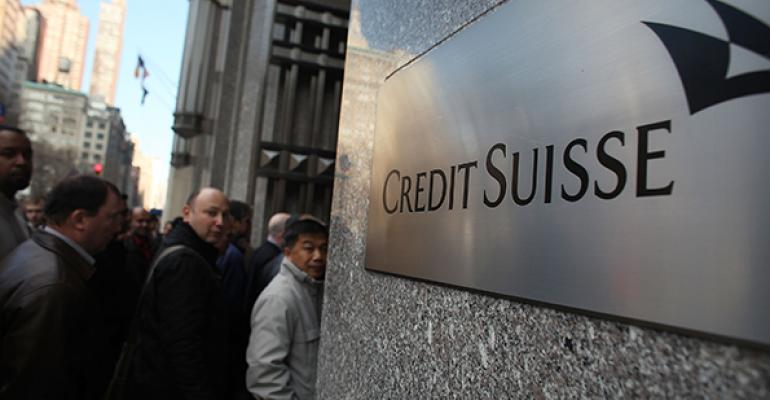By Jan-Henrik Förster
(Bloomberg) --Tidjane Thiam is no longer a man under siege.
As Credit Suisse Group AG enters the final phase of a three-year turnaround plan -- instigated when Thiam replaced Brady Dougan as chief executive officer in 2015 and faced calls to reshape the bank -- the strategy to focus on wealth management is paying off. Net new money rose 8 percent last quarter, while international wealth management and Asia Pacific earnings are surging.
Thiam’s plan to boost the bank’s financial strength has entailed cutting costs and thousands of jobs while reducing the bank’s reliance on volatile trading in favor of more stable wealth management. With the global economy in recovery mode and a $4.3 billion share sale this year bolstering Credit Suisse’s balance sheet, Thiam says the bank is going in the right direction and doesn’t need to heed the break-up call of local activist Rudolf Bohli.
“We are getting close to the end of the restructuring,” Thiam said in a Bloomberg Television interview on Thursday. “We think the plan is working very well -- so why change?”
Bohli, whose firm owns 0.2 percent of the Swiss lender, is urging Credit Suisse to be split into three companies, arguing such a move would double the bank’s current market value of about 40 billion francs. His plan has been dismissed by the bank’s biggest shareholder, Harris Associates.
Still, Thiam plans his first meeting in person with Bohli next week and said he takes account of all shareholder views. In a separate interview, the investor said the bank should put an even greater emphasis on wealth management as returns on the bank’s investment banking businesses are too low.
Net income in the quarter was 244 million francs, compared with estimates for profit of 200 million francs in a Bloomberg survey of seven analysts. Revenue was in line with analyst estimates while the bank said it’s confident of reaching cost savings targets this year.
While wealth managers have been under pressure from negative interest rates and generally higher cash holdings of investors since the financial crisis, Swiss banks -- including competitors Julius Baer and UBS Group AG -- have sought to offset the challenges through cost cuts, recruiting initiatives and increased loan volumes.
Global Recovery
Now, the global economic recovery is adding to the optimism, with the bank saying that it could be a “significant tailwind for our activities in spite of continuing geopolitical uncertainty.”
Credit Suisse rose 3.9 percent to 16.25 francs, after earlier gaining as much as 4 percent.
The bank’s International Wealth Management business -- which covers regions including the Middle East and Latin America -- and Asia Pacific -- which the bank counts as a separate reporting business -- also beat estimates.
Thiam’s focus may now turn more to the trading and investment banking businesses, which did less well, in part because of a trading slump in the third quarter that affected European and Wall Street peers.
The Global Markets unit, led by Brian Chin, missed expectations for pretax income in the third quarter, joining the trading malaise that sunk related earnings at other banks. The unit has been a focal point of Thiam’s overhaul as the bank fired thousands of traders in London and New York and shifted capital to other units.
Trading conditions are “frankly difficult,” Thiam said in the interview. In October “we haven’t seen a fundamental change compared to the conditions of the third quarter. We have seen towards the back-end a pick up in activity. October is a decent month but we are very cautious looking forward.”
Low volatility contributed to a trading slump across the world’s biggest investment banks in the third quarter, including a 28 percent average decline in sales from dealing in bonds, Bloomberg Intelligence data show.
European Rivals
BNP Paribas SA, the biggest French bank, reported a 24 percent decrease in revenue from debt-trading while Deutsche Bank AG and Barclays Plc reported slumps of more than 30 percent from the same business.
Credit Suisse said in the statement that trading in October for the “market dependent” businesses has remained similar to the third quarter with continued low levels of volatility. Overall revenues for Global Markets fell 7 percent compared to the previous-year period. The bank pledged to achieve over $6 billion in revenues in 2018.
Here are some of the key numbers:
- International wealth management pre-tax income 355 million francs vs 329 million estimate.
- Global markets pre-tax income 71 million, compared with estimates of 99 million francs.
- Investment banking pre-tax income 35 million versus 72 million estimate
- Bank’s CET1 ratio in line with analyst estimates at 13.2 percent
To contact the reporter on this story: Jan-Henrik Förster in Zurich at [email protected] To contact the editors responsible for this story: Dale Crofts at [email protected] Andrew Blackman





